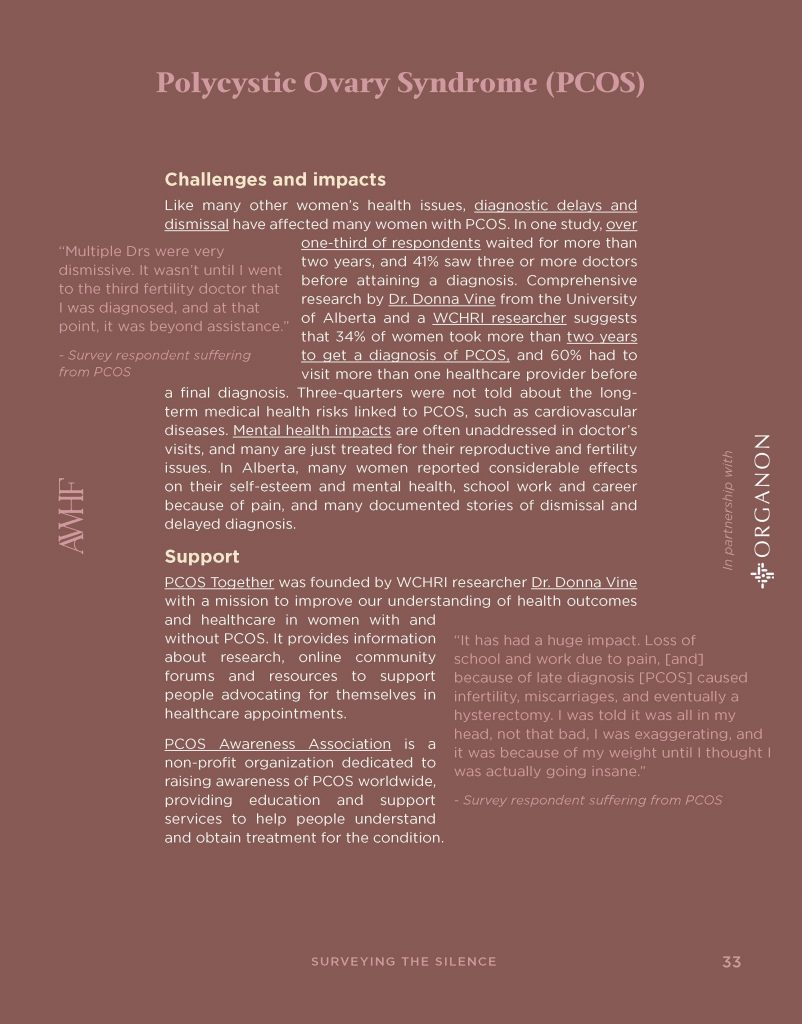Background
Women with PCOS can face multiple health risks including obesity, metabolic syndrome, type 2 diabetes, and heart disease. Due to the high prevalence of PCOS, it’s important that these women are identified within the healthcare system and support is provided in managing health risks throughout their lives. Currently, we have limited health care information related to health care experience, professional health services and the healthcare system that supports women with PCOS.
Aim
The aim of this research is to find out more about the diagnosis of PCOS, patient experiences in the healthcare system, and the healthcare needs of women with PCOS. Our goal is to use this knowledge to inform us about the perceptions of health care and if we can improve the health care services currently available and provided to women with PCOS.
Objective
The aim of this study is to determine the patient-centred and clinical health care needs of women with PCOS and access to diet-lifestyle counselling using a population based questionnaire.
We are working with the Alberta Strategy for Patient-Oriented Research Unit (AbSPORU; Patient Engagement platform) and Alberta Health Services to implement a questionnaire, conduct focus and discussion groups, and determine strategies for including patients as partners and participants in research. Using this valuable lived-experience, we are assessing the patient-centered healthcare experience, perceptions and needs to develop better healthcare, intervention, preventative and support strategies in women with PCOS.
This study is looking for both research participants and patient partners in research. Patient partners help advise and inform the development of research studies, participant recruitment strategies and dissemination of findings.
Expected Outcomes and Significance of Research
The expected outcomes of this study is that it will provide valuable data on health care in women with PCOS in Alberta Canada. Outcomes will include information on PCOS diagnosis, follow-up care after PCOS diagnosis, referrals to other health professionals and access to nutrition services, overall healthcare history and concerns, and health and healthcare experience with having PCOS during the COVID19 pandemic lockdown.
The significance of the study is that it is the first study to survey women with PCOS and their health care and nutrition services related to their disease. The data gathered from this study will help us to determine the scope of health care provided and available to women with PCOS and any gaps in these services. We can then use this evidence to develop a framework to review and improve health care in women with PCOS, and to physicians and health care providers who care for women with PCOS. The framework can then be used to develop guidelines in collaboration with stakeholders (patients, clinicians, health care providers) to optimize health care and patient-centred health care in women with PCOS.
Surveying the Silence Report

In the Alberta Women’s Health Foundation’s (AWHF) latest thought leadership report, “Surveying the Silence: Exploring the impact in women’s health,” we explore the impact of taboos in women’s health and seek to bring attention to medical conditions affecting women’s lives in our province.
We surveyed over 2,200 people in Alberta to understand their top health issues, concerns, and experiences with seeking help for conditions specifically associated with women’s anatomy.
Please click below to read the full report: PCOS & Dr. Vine’s research are highlighted on Page 33
View the Report
Scientific Publications & Conference Proceedings

Title: Challenges in diagnosis and health care in polycystic ovary syndrome in Canada: a patient view to improve health care
Authors: Beate C. Sydora, Michaelann S. Wilke, Maggie McPherson, Sarah Chambers, Mahua Ghosh & Donna F. Vine
Published In: BMC Women's Health. volume 23, Article number: 569 (2023)
